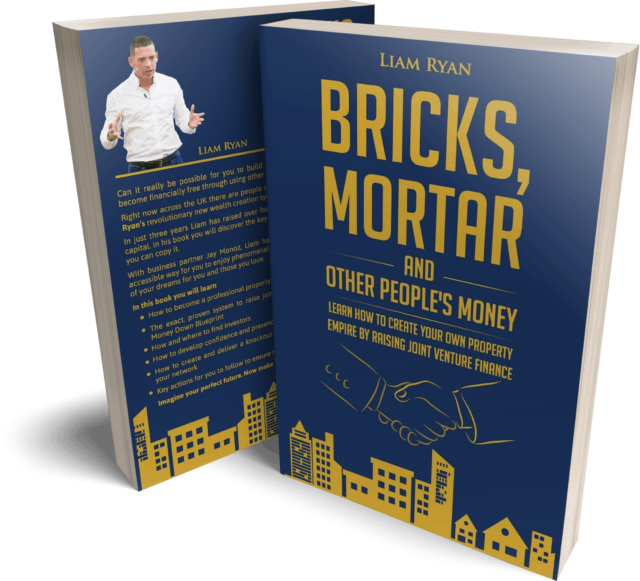Guide to Buying Property Through a Limited Company in the UK

Many property investors consider purchasing properties through a limited company. But what are the benefits of doing so? For investors who are looking to build a property portfolio or invest in UK property from overseas, buying through a limited company could be a good option. Join me, Liam J Ryan, as I take an in-depth look at buying UK property through a limited company, how to go about it, plus the benefits and drawbacks that you should know about.
Table of Contents
ToggleWhat is a Limited Company?
Firstly, you may be wondering what exactly a limited company is. Quite simply, a limited company limits the amount of liability undertaken by the company’s shareholders, i.e. you. When starting a business, some people operate as sole traders, but others will set up a limited company, even if they are the only employer or shareholder. This is beneficial, as the company will be liable for any debts rather than the business owner, as it is considered a separate legal entity. The business will also not have to sell any assets to pay its debts.
Why Buy Property Through A Limited Company?
Buying property through a limited company has some immediate advantages in the form of tax benefits in UK. Limited companies can offset expenses like mortgage interest, maintenance and repairs, and property taxes against their own tax bill, thus retaining more of the rental income from the property. Profits the company makes from rental income can be reinvested in the property and are subject to a lower tax rate. Limited companies will have to pay Corporation Tax but this is a lower rate than capital gains and personal rental income, so it can also save you money.
FAQ: What is Corporation Tax?
Corporation Tax is a tax paid on any profits made by a limited company. Corporation tax rates are 25% for profits above £250,000 and 19% for profits below £50,000. Income tax is 40% for individuals who earn £50,271 to £125,140, and 45% for earnings above £125,140. These figures show how paying Corporation Tax on rental income rather than income tax is preferable.
How To Buy A Property Through A Limited Company?
Here is a step-by-step guide to buying property through a limited company in the UK.
Set Up A Limited Company
First, you need to set up a limited company if you haven’t done so already. Register your company at Companies House – you will need to name a director and shareholder of your company (both can be you), give a company name, state whether you will be the only shareholder or if you have a business partner, and give the company address, which can be your home address. You will also need to register your company as an employer with HMRC, even if you do not intend to hire employees. See this page on the UK government website for more details on setting up a limited company.
Look At Financing Options
If you have sufficient cash reserves, you can of course buy a property outright without having to obtain a mortgage. This is not a common strategy, even for property investors who have that much money available, as it ties up your money in a single non-cash asset. However, if you already have a high value of liquid assets, then a cash sale could be a good option.
You will probably need a mortgage to purchase your property. As a limited company, you will need a different mortgage than if you were buying the property as an individual. The interest rates may be higher, and the mortgage lender may ask you as the director of the company to enter into a personal guarantee, meaning that you could be personally liable for the mortgage repayments. Take the time to find a mortgage lender who can offer favourable terms and interest rates.
Once you have found a suitable mortgage and have a property you want to purchase, the rest of the steps are very similar to buying a house in the usual way. You will need to perform your due diligence, get a survey done on the property, use a solicitor to handle the legal aspects of the purchase and exchange contracts with the seller.
Do You Pay Stamp Duty If You Buy A House Through A Limited Company?
Yes, property purchased through a limited company is still subject to Stamp Duty. Limited companies must also pay a 3% surcharge on this property and any subsequent properties purchased by the limited company.
Can I live in a house owned by my limited company?
In short, yes, but I would not recommend it, as unless you paid market-rate rent to your limited company, HMRC would see this as a benefit in kind (BIK) and could be taxable at a rate between 20% and 45%. Also, most mortgage lenders will not give you a mortgage if you are using the property as a personal dwelling rather than an investment opportunity.
Advantages Of Buying A Property Through A Limited Company
Here are some advantages of buying a property through a limited company:
Tax relief
Personally owning a property that you rent out can incur income tax of up to 45%. If your limited company owned that property, you would only be liable for Corporation Tax of up to 19%. Mortgage interest is also considered a business expense for limited companies, so you can deduct the mortgage interest from the owed corporation tax.
Inheritance Tax Benefits
If you want to leave your property to family or friends after you pass away, they can avoid paying inheritance taxes through Business Property Relief.
Reduced Personal Liability
Owning property as a limited company means the property isn’t technically in your name, so any debts or legal liabilities would be the responsibility of the company, not yourself. Note: if you have given a personal guarantee on the mortgage, you may still be personally liable for the mortgage repayments.
Disadvantages Of Buying A Property Through A Limited Company
Here some some disadvantages of buying a property through a limited company that you should be aware of:
Higher Mortgage Rates
Mortgage lenders will charge higher interest rates to a limited company due to reduced liability, and will usually ask for a deposit of at least 20-25%. Also, fewer lenders will be willing to provide a mortgage for a limited company.
Stamp Duty Surcharge
When a limited company buys a property, not only do they still have to pay Stamp Duty Land Tax (SDLT), they have to pay a 3% surcharge on all property purchases over £40,000. Also, Stamp Duty rises to a flat rate of 15% when companies purchase residential property for more than £500,000.
Capital Gains Tax Allowance Does Not Apply
Limited companies cannot benefit from Capital Gains Tax Allowance, which is set at £3,000 for this year. Selling the property as an individual means you could pay just 18% CGT, plus this allowance, but limited companies would have to pay Corporation Tax on the sale of 19 – 25%.
Basic-Rate Taxpayers Would Not Benefit
If you only pay the basic tax rate (20%) on your income, and are unlikely to earn over £50,270 from your rental income, it is probably not worth the extra admin and hassle that comes with setting up a limited company just to purchase a property. This may change as your financial circumstances do, so consider it in the future.
In conclusion, I will say, it is definitely worth considering the benefits that buying property through a limited company can offer. Take into account your financial situation and consult with a financial advisor who can provide tailored guidance on your specific circumstances before purchasing property as a limited company.
Are you interested in investing in property? Assets For Life can help you get into the exciting world of being an investor – just come to one of our FREE property investment events and meet me, Liam J Ryan, and other property investment experts.
You May Also Be Interested In...

How To Grow A Property Portfolio – Free Online Training
Grow your UK property portfolio from scratch with expert tips, creative strategies and free online

UK Top-Rated Property Investment Education
Learn property investment from UK experts with Assets For Life. Free courses, mentorship, and proven

How To Find Rent To Rent Properties
Discover the best ways to find rent-to-rent properties in the UK, from online portals to
Featured Property Investment Events & Courses
The Property Deal Packaging Summit
The Property Millionaire Bootcamp
The Serviced Accommodation Bootcamp





